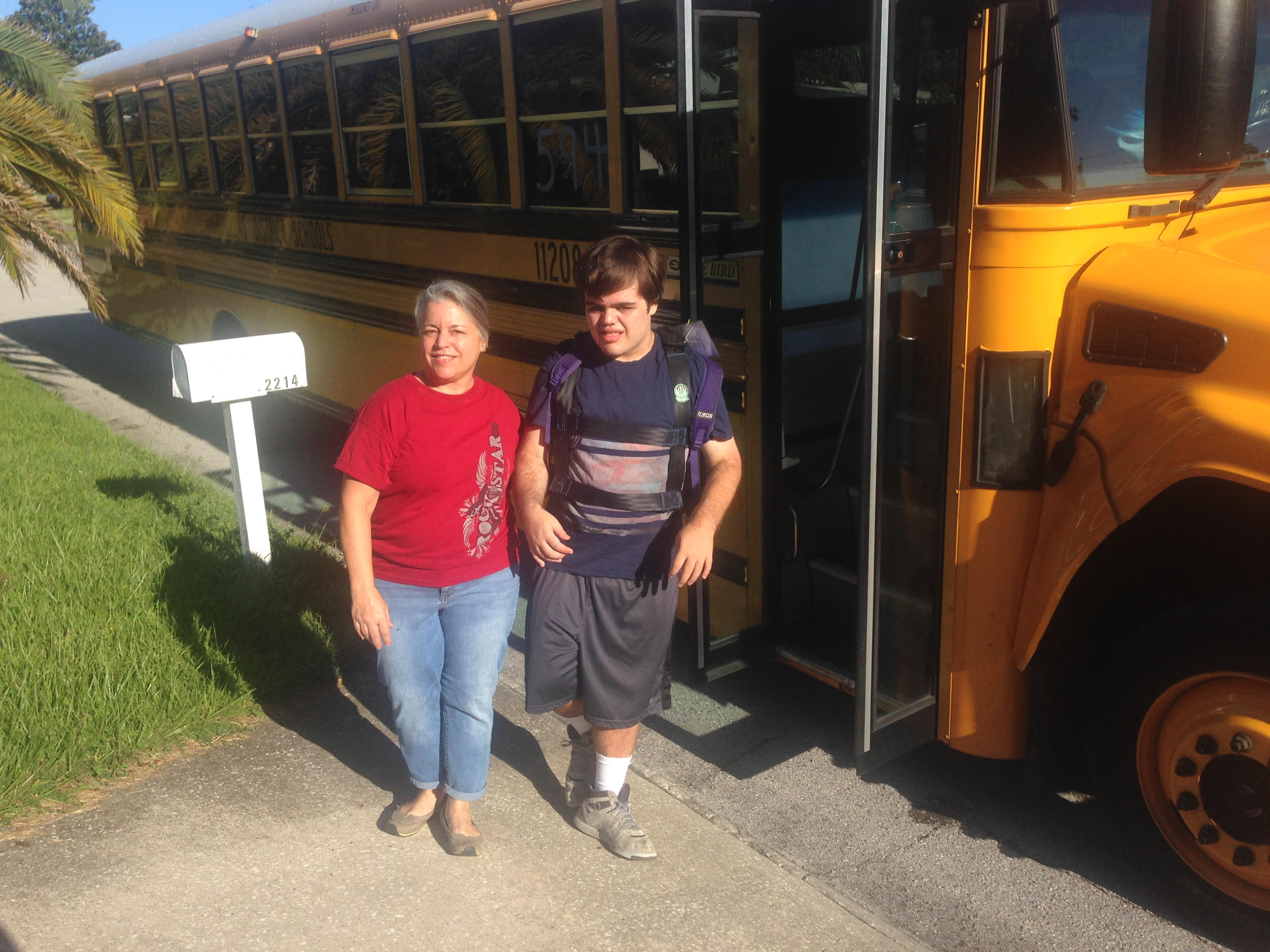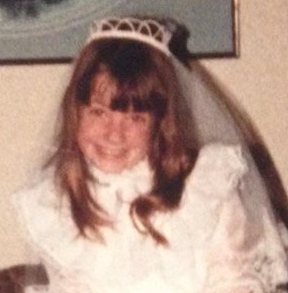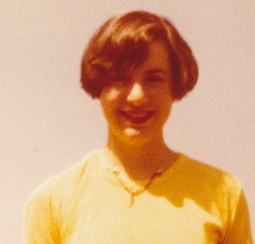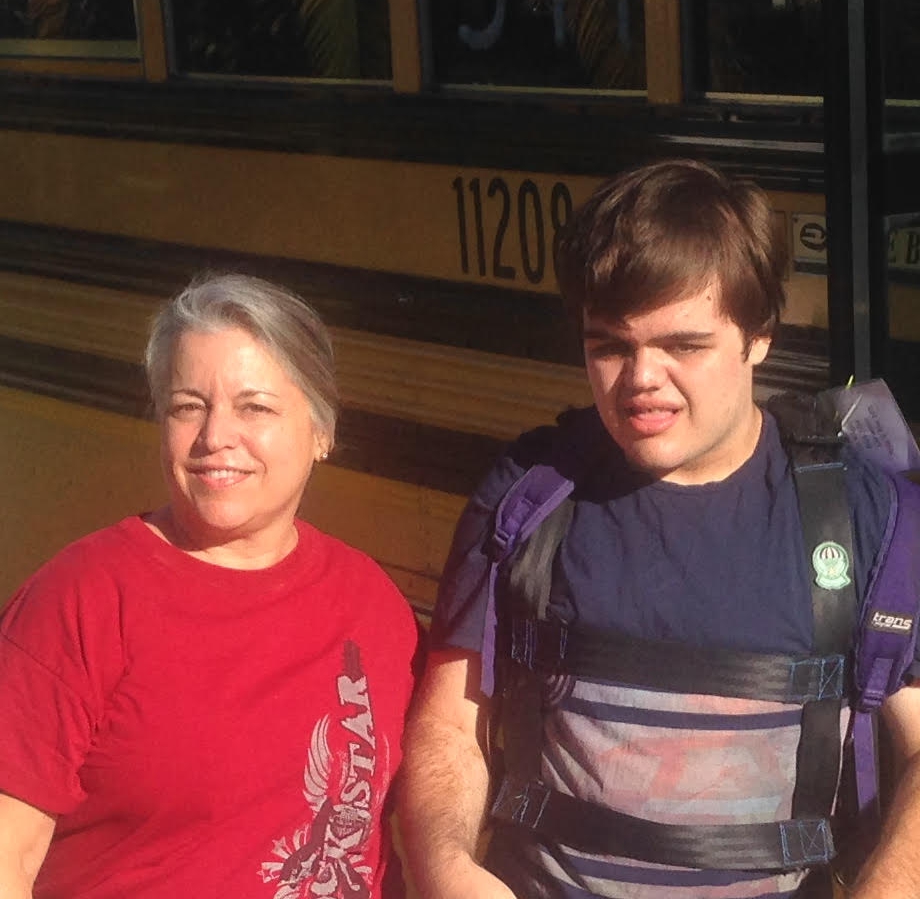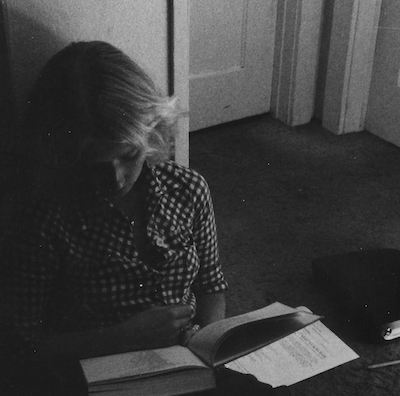I walked my son Desi to the corner where we met his school bus as I did every morning. Even though he was nine years old, I accompanied Desi to his bus every day. He had been born with hydrocephalus, and the damage left him mentally handicapped. Still, he was a happy, friendly child, who, for me, was a very amiable companion. Even with the struggle of raising a special needs child, I truly considered Desi to be a blessing. This wasn’t saintly of me; it’s just that Desi was easy to care for, get along with, and had none of the problematic behaviors to which special needs children can be prone: self-harm, sleepless nights, emotionally explosive days. Desi had a placid temperament. Occasionally he showed his temper, but those were rare disruptions.
We lived on a cul-de-sac, so the bus stopped at the corner a couple of houses down from ours to save the driver the trouble of getting the large vehicle around the end and back out onto the street. That morning, the sun was coming up yellow and pink. As usual, a mockingbird was sitting on the top of the low hedge at our corner. She would dive back into the hedge, or sit perched at the top singing loudly her springtime tribute to the day. Tiny sparrows skittered on the pavement pecking at little morsels on the sidewalk. The easterly breeze ruffled the huge stand of ornamental pampas grass planted in the curve of our neighbor’s semi-circular driveway.
I saw a midnight blue Jaguar parked near our corner. Holding hands as we always did, Desi and I walked past the Jag. The brief time in the early morning of waiting for Desi's bus was always the best part of my day. Sometimes I would sing little songs, and Desi would intone a response of his own. I wondered whose the Jaguar was. I was a bit resentful of its presence; whoever was inside was an interloper in my tranquil morning with Desi.
Desi and I walked across the street to the corner. I tried to ignore whoever that was in the driver’s seat. A tiny, young woman and older boy seated in the car got out and walked over to where Desi and I waited. My first thought was, Great. Now I have to make small talk. And, What could these people possibly be doing on our corner? The young woman was petite, with long blond hair and an angelic face. She was exactly the kind of doll-like, super-feminine woman who always made me feel like some kind of of Norwegian wood troll. Not that I am Norwegian, but I felt like the stout, disheveled beings looked. I neglected my appearance, so no wonder. Compared to me in my baggy, stained, cotton pants and t-shirt, and non-styled, shoulder length hair, she, in her business suit, sleekly coiffed and made-up, was perfect enough to make me hate her on sight.
She introduced herself, Dorothy, and her son, Frankie. “We just moved into the neighborhood. They don’t have our address on the bus route yet, so we are meeting it at your stop,” she said.
I could have followed up this information with questions about where they were from. How did she like the weather? The school? Where did she work? But the serenity of my morning reverie was like an ocean of thought that immediately absorbed any small streams of conversation. I was relieved when, in a few minutes, the bus came.
The wheels of bureaucracy turn slowly, and this scene repeated itself every morning for about two weeks. I would watch her and Frankie pull up in the Jag, wave weakly to her, and offer a less than enthusiastic “Good morning.” She would come over with Frankie. “So, you live in the neighborhood now?” I finally asked. “Yes, we live over on Pinebrook”, she answered. “Oh, that’s over at the northeast part? They’ll get you on the route soon. How long did they say it would be?” I asked. “Maybe two weeks,” was her reply.
Each morning when I saw Dorothy's Jag glide up the street, I got a bit tense at the disturbance in my day. Like Desi, I had become a creature of routine, and any deviation bothered me; yet as I came to really like Dorothy, our conversation became more relaxed. Her sunny exterior was an outward manifestation of her bright soul.
Aside from her glowing nature, which I did not share with her, Dorothy and I had a lot in common since we were both parents of mentally handicapped boys. Frankie was more high-functioning than Desi, and about ten years older. He could speak; Desi can't. Yet they shared some traits: both were dark, handsome kids, both had happy dispositions. Dorothy and I traded stories as we waited for the bus. She told me how Frankie had fallen down some steps at home, hitting his mouth and breaking his teeth. Desi had accidents like that. He once broke his arm just by getting out of bed and tripping over the dog. Frankie seemed happy in his new school. Desi had been going there for five years, and I assured Dorothy that it was a school where the staff really cared, and the kids were treasured.
Dorothy seemed to be at peace with her life. She had a good job at a bank. I was a stay-at-home mom. My life was much lonelier than hers, I guessed, as I measured myself against her. Our talk was superficial, and I never grumbled about my lot in life. I was in survival mode. I tried to put on a good front, but I know I fooled no one with my bluff heartiness. I found out later that Dorothy had survived a bout with cancer. Looking back, I know that she was one of those people who conquer the darkness with their own inner light.
Desi and Frankie got on the bus together. The aides and bus driver greeted them both by name, the doors closed behind the boys, and the bus pulled away from the curb, and down the street.
Not long after that, Dorothy stopped coming with Frankie. Desi and I continued our morning routine of meeting the bus. I would follow Desi up into the bus to say hello to Frankie, who was already onboard. At this point on the stop, there were only a few other kids on the bus. The two assistants on the bus, Teri and Mary, were always happy to see me and say hello. The bus driver, Clea, was a good soul.
Dressed in a shirt and pants, his dark hair neatly trimmed with a side part, Frankie looked like a teenager from the fifties. His wide grin revealed snaggly, white teeth. I said “Good morning, Frankie!” He returned my greeting with the gusto of someone seeing an old friend after a long absence. He had that open demeanor with no pretense that is the hallmark of special needs kids. As the bus pulled away from the curb, I could see Frankie’s smiling face looking out at me.
After Dorothy stopped coming with Frankie, I regretted that Dorothy and I hadn't become friends who would make plans to see each other outside of our bus stop visits. No doubt she was too busy with work and everything else to start including new people in her life. For my part, I simply did not have the wherewithal to do any socializing whatsoever. My life was circumscribed, revolving around my family.
Not long after Dorothy and Frankie stopped waiting at our bus stop, I was out in the back yard with the kids one sunny, beautiful Sunday. It was Mother's Day and I was spending a glorious day with my kids doing nothing but lounging in the hammock, playing with the dog, and just enjoying being.
To the north of our subdivision was a hilly, wooded area. Tall sand pines grow on ancient dunes that are a geological remnant of what this coastal area once was. A wide road traversed the old dunes; side streets along which large homes nestled in the woods empty onto the wider thoroughfare. The screaming sirens were from this main road. The sirens kept coming; the mad cacophony reached a crescendo minutes later, then stopped. Must’ve been a bad wreck was my only thought; other than that, my perfect day with the kids went undisturbed.
The next day Desi and I continued our morning routine of meeting the bus, but Frankie wasn’t on the bus. I didn’t think anything of it; kids miss school for all kinds of reasons. When he wasn’t there the next day either, I asked Clea where he was. Teri came to the front of the bus to meet me on the steps. “Frankie’s mom was killed in a car crash Sunday. Right up here on Alderman.” I thought immediately of the sirens I had heard.
Teri told me that Dorothy had pulled out onto Alderman Road, and a young woman coming too fast over a blind hill had t-boned the Jag. There was something about Dorothy’s car being smashed into a concrete power pole. I didn’t want to know any more. I thought, I could have gotten to know her better. And now she’s gone.
In the days after her death I found out when and where Dorothy's funeral was. I would go, of course. I had only known her briefly, but in death, she had taken on a saintly persona. It is a commonplace, but nonetheless true, that when someone dies we see who that person was, and what they meant to us.
The day of her funeral, I drove into the church parking lot. I had to sit in my car for a while before going inside. It seemed momentous to me that I was even there. In recent years, I had never had the urge to enter a church. As with many fallen-away Catholics, this was a place I associated with my youth, a place that had no meaning for me anymore. To me, the Church represented a lot of wrong-headed and outmoded notions. I lumped Christians into the category of simple-minded evangelicals, tradition-bound, out-of-touch simpletons who had no problem taking their marching orders from an exclusive, male-dominated hierarchy that was a relic of the medieval past. The last time I had been inside one was about nine years earlier for the funeral of one of my uncles.
As I sat in my car in the parking lot behind the church, I was fighting a reluctance to go inside. I was surprised that I felt this way. I was apprehensive at facing a mass that I had forgotten, and the thought of being lost in a ritual with which I was unfamiliar was off-putting. Still sitting in the car, trying to gather myself to go in, I saw a man standing in the parking lot in front of my car. The lot is shaded by a thick canopy of oaks; the man looked up between the branches into the brilliant blue sky. He just stood there. I know now that he was one of the parish priests. He must have been praying. He walked back to the church, and I followed him.
The narthex of the church was filled with mourners. There were several people I knew from Desi’s and Frankie’s school. That the church was filled to capacity with mourners.
I took my place at a back pew. The family was sitting up front, and I couldn’t see them. People were openly sobbing. Waiting for the mass to begin, I was overcome with emotion, and dug blindly into my purse for a tissue. I hardly knew her, I told myself. Why am I losing it like this? I looked around the church. Everyone’s face registered shock and grief. Obviously, the loss of Dorothy deeply affected everyone she knew.
My own grief, however, was a result of realizing that Frankie had just lost the person who loved him the most, and there would never be another to replace her in his life. I could not help but think of what Desi’s life would be without me. Desi was only nine, and I was healthy, but this was a reality that I had not faced until that moment. I would probably die before he would. Who would take care of him? More importantly, who would love him?
Only the parent of a child like Desi or Frankie can understand this. Parents of so-called normal or typical children know that there is a chance that their child, in the future, can find love. There exists the possibility that in our lives, some of us might find a love to compare to our mother’s love; this was not a possibility for Desi. This was a heartbreaking realization for me. It might seem obvious, but until that moment I had never faced it. With tears streaming down my face as I choked back sobs, I was imagining Desi without me there to protect and to love him. It wasn’t just a matter of who will see that his needs are met. Desi has a large family, and there will always be someone there to insure that he is housed, clothed, and fed.
But no one will ever love him as I do.
As I was struggling to contain my emotion, the music began. Coming down the aisle were the altar servers and the priest. The congregation stood up. I couldn’t stop crying. Behind me I heard a voice loudly singing “Amazing Grace.” I turned to see who it was. It was the priest coming up the aisle with the processional. He was an impossibly golden person – tall, with an upright posture. The light from the stained glass windows danced around him, and seemed to emanate from him like an aura. Like Dorothy, he was angelic; there is no other word for it. He was in shining vestments, singing out in the most beautiful voice I had ever heard. I stopped crying; I was truly amazed.
That night, I sat in Desi’s darkened bedroom for a while after he had fallen asleep. His even breath was barely audible. As I left the room, I bent over him, and lightly kissed his cheek.
After receiving degrees in psychology and law and rearing three boys, Davanna Cimino is fulfilling her lifelong dream of being a writer. She has written a couple of screenplays as well as poetry. “Mother’s Day” is her first published piece. She lives on the Gulf Coast of Florida, where she works as an assistant at a school for mentally handicapped children, and is currently at work on a novella. You can find her on Twitter @davanna.
